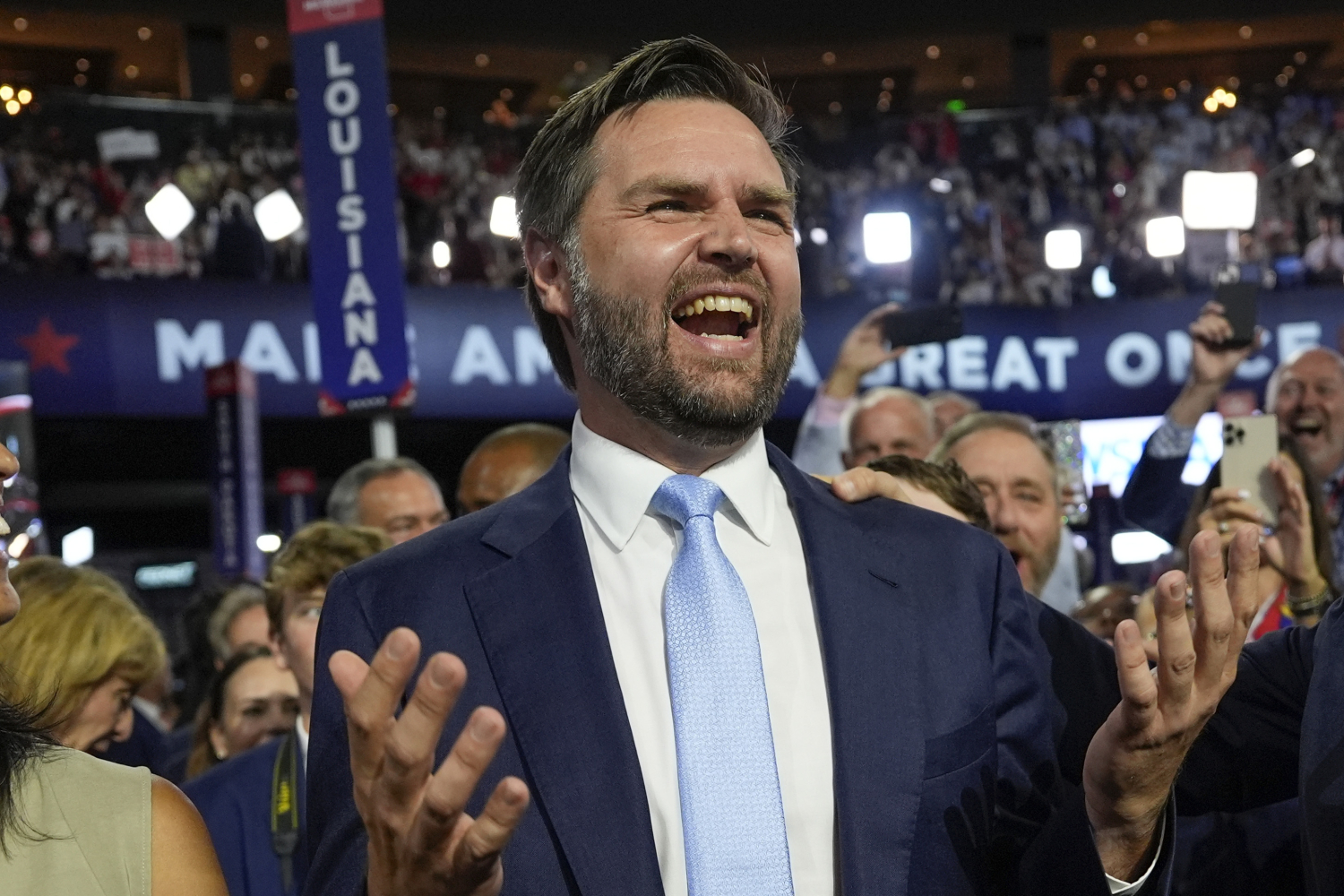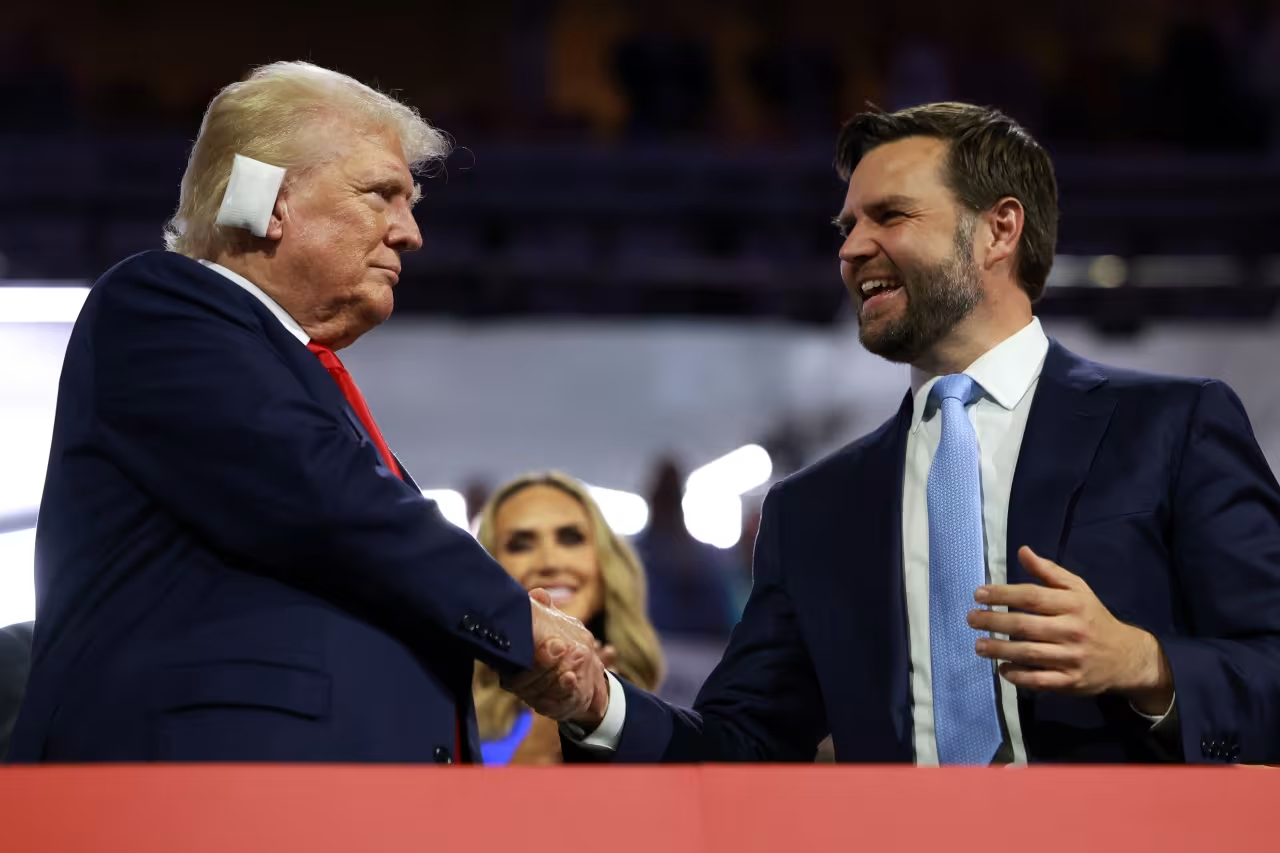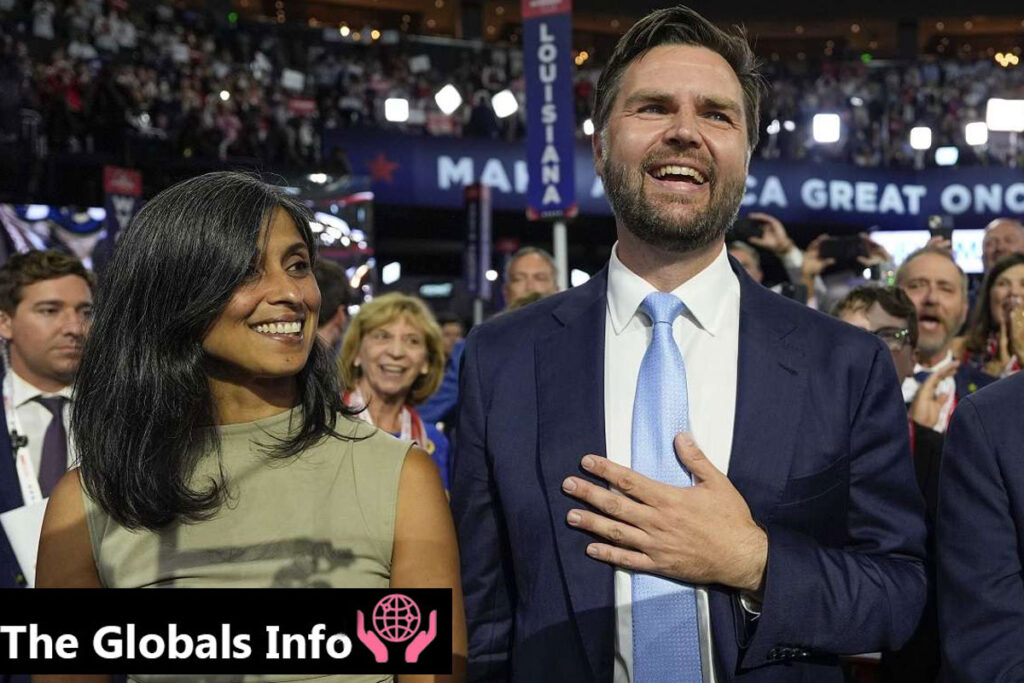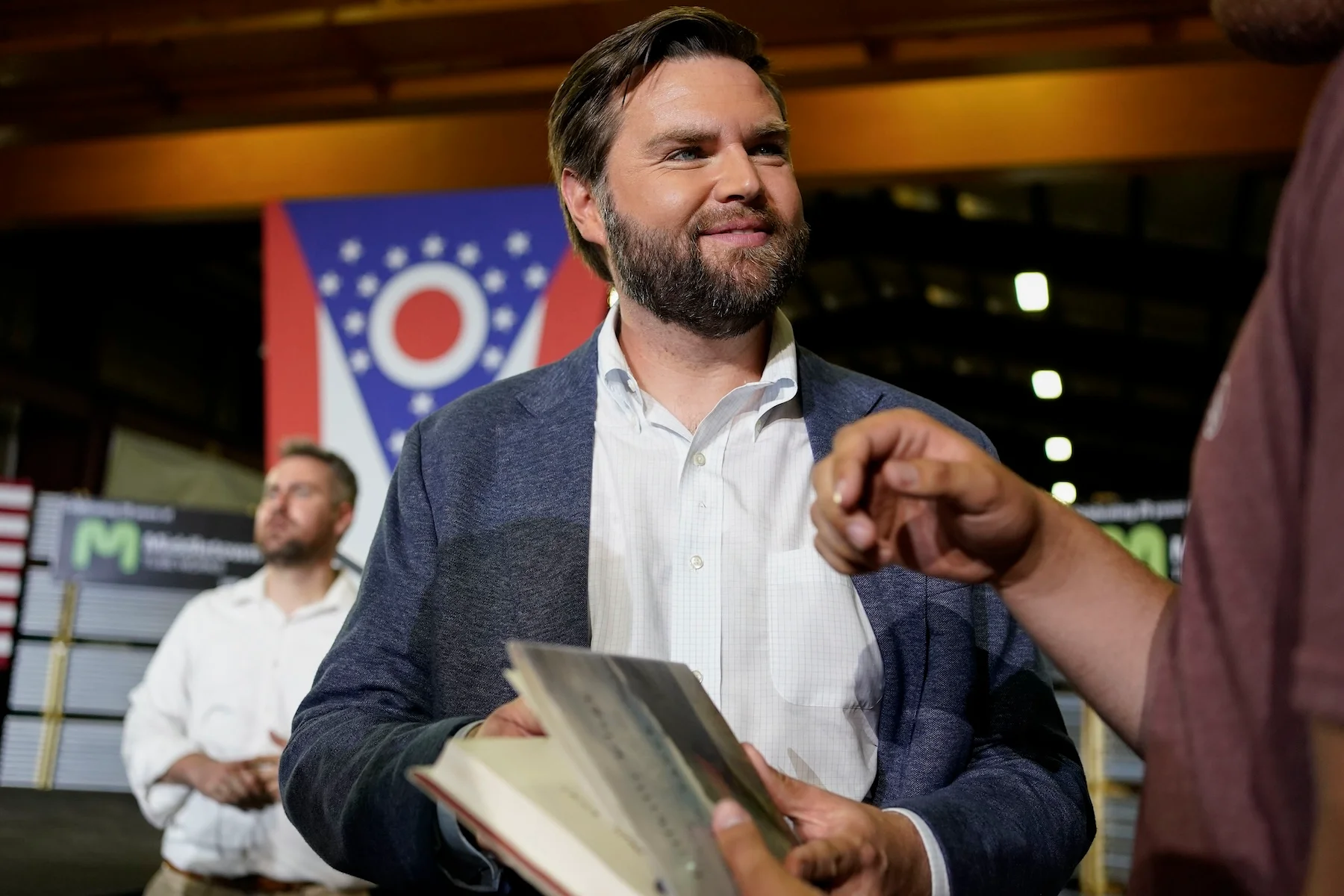JD Vance Announces Candidacy for Senate in Ohio, Promising Change
JD Vance, the renowned author of “Hillbilly Elegy,” has officially thrown his hat into the political arena by announcing his candidacy for the U.S. Senate seat representing Ohio. Vance, a Republican, made his bid public with a promise of bringing significant change to the state, emphasizing economic revitalization and a departure from traditional political norms.
Vance’s announcement comes amidst a backdrop of increasing political polarization and economic challenges facing Ohio. His candidacy is seen as a significant development within the Republican Party, aligning with his outspoken criticism of both parties’ failures in addressing issues affecting working-class Americans.
Central to Vance’s campaign is his advocacy for policies aimed at revitalizing Ohio’s economy, particularly in struggling rural and industrial areas. He has been vocal about the need for job creation, infrastructure investment, and support for small businesses as essential components of his economic agenda.
In addition to economic issues, Vance has also highlighted his stance on cultural and social issues, positioning himself as a staunch defender of conservative values. His campaign rhetoric often touches on themes of family values, personal responsibility, and the preservation of American traditions.
Vance’s entry into the Senate race marks a departure from his previous role as a prominent commentator and author. “Hillbilly Elegy,” his memoir exploring the struggles of white working-class Americans in Appalachia, garnered widespread acclaim and brought him into the national spotlight.
Critics, however, have pointed to Vance’s lack of political experience and questioned his ability to navigate the complexities of federal governance effectively. Moreover, his candidacy has sparked debates about the direction of the Republican Party, with some viewing him as a potential bridge between its establishment and more populist factions.
As Vance launches his campaign, he faces a competitive primary race and potential challenges from both Democratic and third-party candidates in the general election. His success will likely hinge on his ability to resonate with Ohio voters across diverse socioeconomic and ideological backgrounds.
JD Vance’s candidacy for the U.S. Senate represents a significant development in Ohio’s political landscape. With a focus on economic revitalization and conservative values, Vance aims to position himself as a voice of change and renewal within the Republican Party, setting the stage for a closely watched electoral contest in the coming months.
JD Vance Faces Criticism Over Controversial Statements on Social Media
JD Vance, author and Republican Senate candidate from Ohio, has recently faced criticism due to controversial statements made on social media platforms. These statements have sparked debates and raised concerns about Vance’s positions on various issues, impacting his candidacy and public perception.
One of the primary sources of controversy surrounding Vance involves his past comments on topics such as immigration, race relations, and cultural issues. Critics argue that some of his remarks are divisive and insensitive, particularly towards marginalized communities. For instance, Vance has been criticized for his views on immigration reform, which some perceive as exclusionary or xenophobic.
Furthermore, Vance’s commentary on social media has often been seen as provocative and confrontational, drawing both support and condemnation from different quarters of the political spectrum. His outspoken nature has been a double-edged sword, garnering him attention but also exposing him to scrutiny over the consistency and coherence of his policy positions.
In addition to policy controversies, Vance’s personal background and associations have also come under scrutiny. As a prominent figure in conservative circles, he has been linked to various organizations and individuals with controversial or far-right views, which has further fueled debate about his ideological alignment and political affiliations.
Moreover, Vance’s candidacy has raised questions about his readiness for public office, given his limited experience in electoral politics. While his profile as an author and commentator has provided him with a platform to engage with national issues, critics argue that governing requires a different set of skills and responsibilities.
Despite the criticisms, Vance maintains a strong base of support among conservative voters who appreciate his outspokenness and willingness to challenge establishment norms. His campaign continues to emphasize themes of economic revitalization, cultural conservatism, and opposition to perceived overreach by federal government agencies.
Looking ahead, Vance’s ability to address and mitigate the controversies surrounding his candidacy will likely influence his electoral prospects. The outcome of the Senate race in Ohio will not only impact the state’s political landscape but also serve as a barometer for broader trends within the Republican Party and national politics.
JD Vance’s candidacy for the U.S. Senate has been marked by controversy and scrutiny over his statements and positions on social media. As he navigates the campaign trail, Vance faces the challenge of reconciling his provocative rhetoric with broader voter expectations while seeking to solidify his support base ahead of the upcoming election.
JD Vance’s Memoir ‘Hillbilly Elegy’ Sparks National Debate on Poverty and Opportunity

JD Vance’s memoir “Hillbilly Elegy” has become a catalyst for a national conversation on poverty, opportunity, and the American Dream. Published in 2016, the book vividly portrays Vance’s upbringing in Appalachia and his family’s struggles with poverty, addiction, and cultural dislocation.
One of the central themes of “Hillbilly Elegy” is the portrayal of the white working-class experience in America’s Rust Belt, particularly in regions like Ohio and Kentucky. Vance provides a personal narrative that explores the complex social and economic factors contributing to poverty and social dysfunction within his community.
The memoir gained widespread attention for its candid depiction of issues such as family breakdown, substance abuse, and economic stagnation. Vance argues that these challenges are not just economic but also deeply rooted in cultural attitudes and societal expectations, making upward mobility difficult for many in similar circumstances.
“Hillbilly Elegy” sparked debates across political and academic circles, with some praising Vance for shedding light on overlooked aspects of American life and others critiquing his portrayal as overly simplistic or stereotypical. Critics have argued that Vance’s narrative overlooks structural barriers and systemic inequalities that contribute to poverty, focusing instead on individual choices and cultural explanations.
Despite the controversies, the book resonated with readers who saw parallels between Vance’s story and broader societal trends. It became a bestseller and a topic of discussion in policy debates, influencing conversations about social mobility, welfare reform, and economic revitalization in post-industrial America.
Vance’s memoir also catapulted him into the national spotlight, leading to appearances in media and public speaking engagements where he continued to advocate for policies aimed at addressing the challenges faced by working-class communities. His perspective as both an insider and an observer of Appalachia provided a unique lens through which to understand the complexities of poverty and opportunity in America.
Moreover, “Hillbilly Elegy” inspired a film adaptation released in 2020, directed by Ron Howard and starring Glenn Close and Amy Adams. While the film received mixed reviews, it renewed interest in Vance’s narrative and brought his story to a broader audience.
JD Vance’s memoir “Hillbilly Elegy” sparked a national debate on poverty, opportunity, and the American Dream by offering a personal and sometimes controversial perspective on the challenges faced by white working-class Americans. Whether praised or criticized, Vance’s portrayal has contributed to ongoing discussions about social and economic inequality, cultural values, and the role of government in addressing systemic issues affecting marginalized communities across the United States.
JD Vance’s Policy Proposals: A Closer Look at His Economic and Social Plans

JD Vance, Republican Senate candidate from Ohio, has put forward a series of policy proposals that blend economic conservatism with a focus on cultural and social issues. His platform reflects his background as an author and commentator, aiming to address the economic challenges facing Ohio while emphasizing traditional values and personal responsibility.
Economically, Vance advocates for policies designed to revitalize Ohio’s industrial and rural communities. Central to his economic agenda is a push for job creation through deregulation and tax incentives aimed at attracting businesses to the state. He supports infrastructure investment, particularly in transportation and broadband, to enhance connectivity and stimulate economic growth in underserved areas.
Moreover, Vance prioritizes vocational education and workforce development programs, arguing that equipping workers with technical skills will strengthen Ohio’s labor market and reduce unemployment. He also emphasizes the importance of supporting small businesses and entrepreneurship, viewing them as critical drivers of local economies.
On social and cultural issues, Vance aligns himself with conservative values, promoting policies that uphold traditional family structures, religious freedom, and personal accountability. He has been vocal in his opposition to progressive social policies, advocating for restrictions on abortion rights and supporting Second Amendment rights.
Vance’s stance on immigration policy reflects a restrictionist approach, emphasizing border security and enforcement measures to curb illegal immigration. He argues that controlling immigration is essential for safeguarding American jobs and preserving national identity.
Critics have raised concerns about the potential impact of Vance’s policies on marginalized communities, arguing that his emphasis on individual responsibility may overlook systemic barriers to economic opportunity. They also question the feasibility of some of his proposals, particularly in light of broader economic trends and demographic shifts affecting Ohio and the Rust Belt region.
Nevertheless, Vance’s policy platform resonates with many conservative voters who appreciate his straightforward approach and emphasis on economic revitalization and cultural conservatism. His campaign has garnered support from various factions within the Republican Party, positioning him as a prominent voice in ongoing debates about the party’s direction and priorities.
As Vance continues to campaign for the Senate seat, his policy proposals will likely be a focal point of discussion and scrutiny. Their reception among Ohio voters will ultimately determine his electoral prospects and the extent to which his vision for economic and social reform aligns with the needs and aspirations of the electorate.
JD Vance’s policy proposals reflect a blend of economic conservatism and cultural traditionalism, focusing on job creation, small business support, and social values. While his platform has garnered support from conservative voters, it has also sparked debates about its implications for economic equity and social justice in Ohio and beyond.
JD Vance Receives Endorsements from Key Political Figures in Ohio

JD Vance, the Republican Senate candidate from Ohio, has received significant endorsements from key political figures within the state, underscoring his growing influence and support base as he vies for the U.S. Senate seat.
One of Vance’s notable endorsements comes from former President Donald Trump, who endorsed him early in his campaign. Trump’s endorsement carries weight among Republican voters in Ohio, many of whom view Trump as a transformative figure within the party. Trump’s backing of Vance signals a strategic alignment aimed at mobilizing conservative voters and solidifying Vance’s position as a frontrunner in the Republican primary.
In addition to Trump, Vance has garnered endorsements from several prominent Ohio Republicans, including state legislators, county officials, and grassroots activists. These endorsements highlight Vance’s ability to build a coalition within the party establishment while also appealing to grassroots conservatives who are drawn to his outsider status and willingness to challenge traditional political norms.
Furthermore, Vance’s endorsements extend beyond the Republican Party, with support from conservative advocacy groups and influencers who view him as a champion of their values. These endorsements provide Vance with organizational support and grassroots mobilization efforts crucial for a successful electoral campaign.
The endorsements also serve to bolster Vance’s credibility and visibility within Ohio’s political landscape, positioning him as a formidable contender in the race for the Senate seat. They lend legitimacy to his candidacy and reinforce his campaign’s narrative of bringing change and fresh perspectives to Washington.
However, Vance’s endorsements have not been without controversy. Some critics argue that his alignment with Trump and other conservative figures reflects a move towards polarizing politics and may alienate moderate voters in Ohio. They caution that such endorsements could overshadow Vance’s policy proposals and ability to appeal to a broader electorate beyond traditional Republican strongholds.
Moreover, Vance’s endorsements from conservative circles have sparked debates about the direction of the Republican Party in Ohio and nationally. His campaign represents a fusion of economic populism, cultural conservatism, and anti-establishment rhetoric that resonates with a segment of the party base seeking change and disruption in politics.
As Vance continues to campaign, his endorsements will play a crucial role in shaping voter perceptions and mobilizing support ahead of the primary and general elections. The outcome of the Senate race in Ohio will not only impact the state’s political landscape but also serve as a barometer for broader trends within the Republican Party and national politics.
JD Vance’s endorsements from key political figures and conservative groups underscore his growing influence and support within Ohio’s Republican Party. While they provide organizational strength and grassroots backing, they also provoke discussions about the ideological direction of the party and its implications for the upcoming elections.
JD Vance’s Background: From Appalachia to Prominent Political Figure

JD Vance’s journey from Appalachia to becoming a prominent political figure in Ohio reflects a narrative of personal resilience, cultural insight, and a deep commitment to addressing the challenges facing working-class Americans.
Born in Middletown, Ohio, Vance grew up in a Rust Belt community deeply affected by economic decline and social upheaval. His upbringing was marked by instability, with experiences of poverty, family dysfunction, and substance abuse prevalent in his early life. These formative years would later shape his perspectives on social issues and economic policy.
Vance’s breakthrough into national prominence came with the publication of his memoir, “Hillbilly Elegy,” in 2016. The book candidly explores the struggles and complexities of white working-class life in Appalachia and the Rust Belt. It resonated widely, sparking discussions about poverty, opportunity, and cultural dynamics in America. The memoir’s success propelled Vance into the spotlight as a commentator and advocate for working-class communities.
Prior to his foray into politics, Vance pursued a career that blended academia, law, and entrepreneurship. He earned degrees from Ohio State University and Yale Law School, where he developed a keen understanding of socioeconomic issues affecting marginalized communities. His professional background includes work in venture capital and as a principal at a Silicon Valley investment firm, providing him with insights into economic development and business innovation.
Vance’s decision to enter politics was motivated by a desire to address what he sees as systemic challenges facing Ohio and the broader Rust Belt region. His campaign for the U.S. Senate seat focuses on themes of economic revitalization, job creation, and restoring cultural values. He has positioned himself as a voice for conservative principles, advocating for policies that promote individual responsibility, family stability, and limited government intervention.
Central to Vance’s appeal is his ability to connect with voters through personal narrative and policy proposals aimed at addressing the root causes of economic and social hardship. His background as a native of Appalachia and his experiences growing up in a working-class environment resonate with many Ohioans who feel overlooked by traditional political elites.
Vance’s political trajectory has not been without controversy. His outspoken views on immigration, cultural issues, and economic policy have drawn criticism from opponents who question the feasibility and fairness of his proposals. Nevertheless, Vance’s candidacy has galvanized support from within the Republican Party and garnered endorsements from influential figures, including former President Donald Trump.
As Vance continues to campaign for the Senate seat, his background and personal story remain central to his appeal to voters. He presents himself as a candidate who understands the struggles and aspirations of ordinary Ohioans, offering a vision for renewal and opportunity in a state grappling with economic transformation and social change.
JD Vance’s journey from Appalachia to a prominent political figure illustrates his resilience and commitment to addressing the challenges facing working-class Americans. His background, shaped by personal experiences and professional insights, informs his policy priorities and resonates with voters seeking a voice for economic and cultural renewal in Ohio and beyond.
JD Vance Clashes with Opponents in Heated Senate Debate

JD Vance, the Republican Senate candidate from Ohio, recently engaged in a heated debate that underscored the intense competition and contrasting visions among the candidates vying for the Senate seat. The debate, a pivotal moment in the campaign, featured Vance clashing with his opponents on key issues ranging from economic policy to social issues and the role of government.
One of the focal points of the debate was Vance’s economic agenda, which emphasizes deregulation, tax incentives for businesses, and vocational education. He argued passionately for his proposals, portraying them as essential for revitalizing Ohio’s economy and creating opportunities for working-class families. Vance positioned himself as a champion of small businesses and job creation, criticizing what he views as excessive government intervention and bureaucratic hurdles hindering economic growth.
On social issues, Vance defended his conservative stance on topics such as abortion rights, immigration reform, and Second Amendment rights. He articulated his support for stricter immigration controls, citing concerns about national security and the impact of illegal immigration on job opportunities for American workers. Vance also reiterated his opposition to abortion, aligning himself with pro-life advocates and emphasizing the sanctity of life as a core principle.
Throughout the debate, Vance clashed with his opponents, particularly on the ideological spectrum. His critics challenged the feasibility and fairness of his economic policies, arguing that his emphasis on deregulation could jeopardize environmental protections and worker rights. They also questioned the inclusivity of his immigration proposals, expressing concerns about their potential impact on immigrant communities and labor dynamics.
Moreover, Vance faced scrutiny over his past remarks and associations, with opponents highlighting controversial statements made on social media and his ties to conservative organizations and figures. These criticisms aimed to paint Vance as out of touch with the diverse and evolving needs of Ohio’s electorate, particularly in an era of increasing political polarization and social change.
Despite the contentious exchanges, Vance maintained a steadfast demeanor and sought to pivot the discussion back to his vision for Ohio’s future. He reiterated his commitment to representing the interests of ordinary Ohioans, pledging to prioritize economic revitalization, family values, and national security if elected to the Senate.
The debate highlighted the stakes of the Senate race in Ohio, with Vance positioning himself as a disruptor within the Republican Party and a contender willing to challenge established political norms. His performance resonated with supporters who value his outsider status and willingness to confront conventional wisdom in Washington.
Looking ahead, Vance’s ability to navigate the aftermath of the debate and effectively communicate his message to voters will be crucial for his electoral prospects. The outcome of the Senate race in Ohio will not only shape the state’s political landscape but also serve as a barometer for broader trends within the Republican Party and national politics leading up to the election.
Conclusion
JD Vance’s participation in a heated Senate debate underscored the competitive nature of the race and highlighted the contrasting visions among the candidates on key policy issues. His performance, marked by clashes with opponents and defense of his conservative agenda, showcased his determination to lead Ohio in a new direction if elected to the U.S. Senate.
FAQs
Who is JD Vance?
JD Vance is a prominent author, commentator, and Republican Senate candidate from Ohio. He gained national attention with his memoir “Hillbilly Elegy,” which explores his upbringing in Appalachia and the challenges faced by working-class Americans.
What is “Hillbilly Elegy” about?
“Hillbilly Elegy” is JD Vance’s memoir that delves into his childhood and family life in Appalachia. It examines themes of poverty, addiction, and the cultural dynamics of white working-class communities in the Rust Belt.
What are JD Vance’s political views?
JD Vance identifies as a conservative and emphasizes economic revitalization, job creation, and support for small businesses in Ohio. He also advocates for conservative positions on social issues such as abortion rights, immigration reform, and Second Amendment rights.
What is JD Vance’s background?
JD Vance grew up in Middletown, Ohio, experiencing firsthand the economic challenges and social issues prevalent in Rust Belt communities. He went on to study at Ohio State University and Yale Law School, followed by a career that included work in venture capital and as a principal at a Silicon Valley investment firm.
What is JD Vance’s campaign platform?
JD Vance’s campaign platform focuses on economic policies to revitalize Ohio’s economy, including deregulation, tax incentives for businesses, and vocational education. He also emphasizes cultural conservatism, advocating for traditional family values and limited government intervention.
Has JD Vance received endorsements?
Yes, JD Vance has received endorsements from key political figures within Ohio and conservative circles, including former President Donald Trump. These endorsements highlight his growing influence and support base within the Republican Party.
What controversies has JD Vance faced?
JD Vance has faced criticism for some of his past statements on social media and his positions on immigration and social issues. Critics argue that his views may not align with the broader electorate in Ohio, particularly on issues related to diversity and inclusion.
What is JD Vance’s stance on immigration?
JD Vance advocates for stricter immigration controls, emphasizing border security and enforcement measures to curb illegal immigration. He argues that controlling immigration is necessary to protect American jobs and national security.



